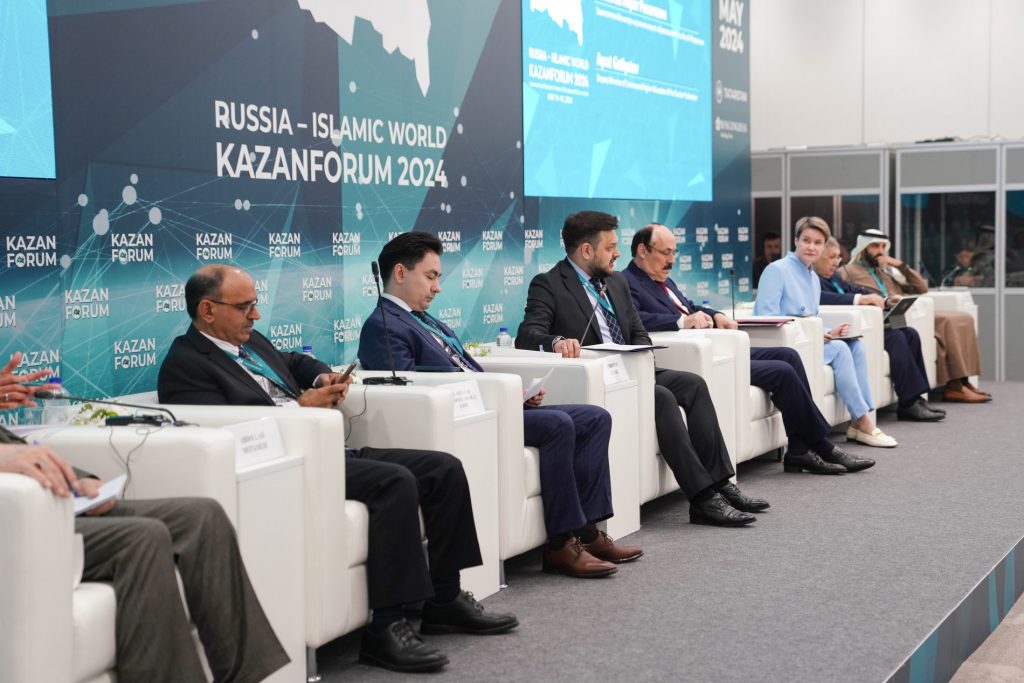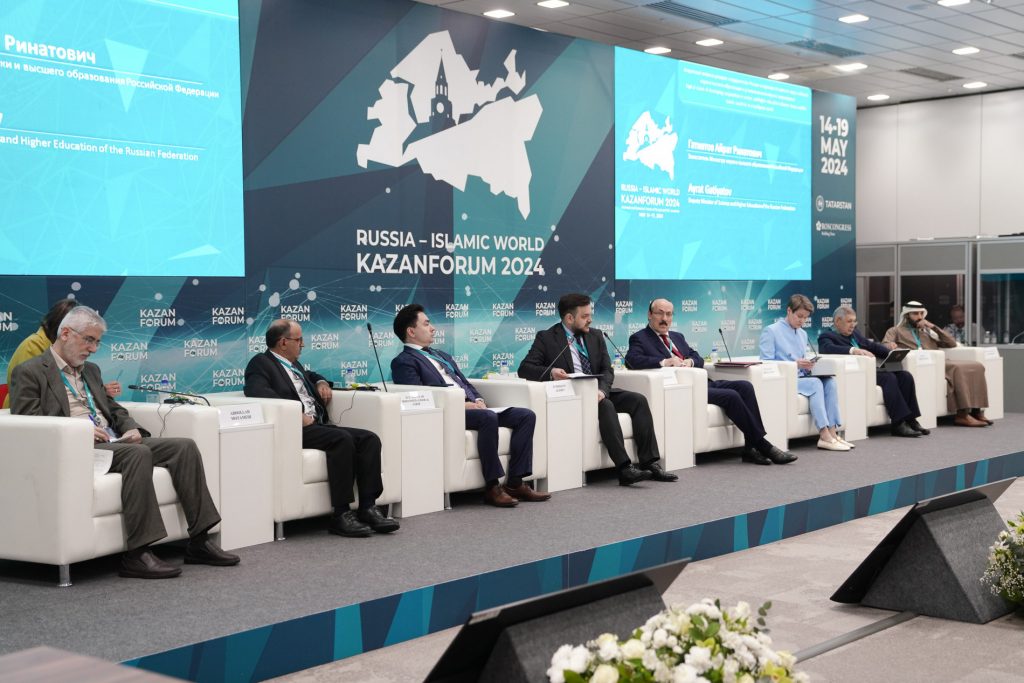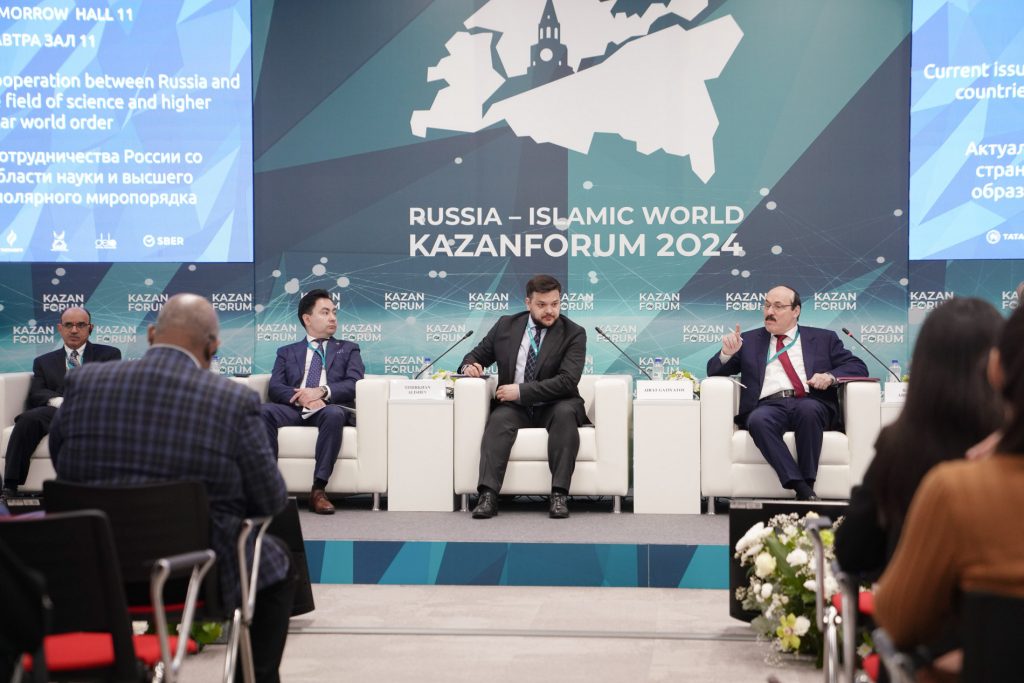Topical Issues of Developing Cooperation in Science and Education between Russia and the Islamic Countries panel session held by Ministry of Science and Higher Education of Russia and KFU at KazanForum 2024




The event took place on 17 April.
The panel session was moderated by Ramazan Abdulatipov, Director of the Center for Scientific and Methodological Support of State Cultural Policy and Traditional Spiritual and Moral Values of the Financial University of Russia. He noted that special attention during the discussion will be paid to the development of education and educational environment not only in Russia, but also in Islamic countries.
Among the speakers were Deputy Minister of Science and Higher Education of the Russian Federation Airat Gatiyatov, Chairman of the Council of Sirius Federal Territory, Head of the Talent and Success Foundation Yelena Shmelyova, General Coordinator of the OIC Standing Committee on Scientific and Technical Cooperation (COMSTECH, Pakistan) Muhammad Iqbal Choudhary, President of the Tatarstan Academy of Sciences Rifkat Minnikhanov, Vice-Rector for International Affairs of KFU Timirkhan Alishev, and other distinguished guests.
Vice-Rector for Economic and Strategic Development Marat Safiullin and Vice-Rector for Academic Affairs Yekaterina Turilova joined the session.
Deputy Minister Gatiyatov greeted everyone on behalf of the Minister of Science and Higher Education of Russia Valery Falkov. He presented a report on the work to ensure high-quality and affordable higher education, and also noted the priority areas of the Ministry’s activities to develop educational interaction with OIC.
“The multipolar system of international relations is actively forming. This process is irreversible, and it is happening before our eyes and has an objective nature – these are the words of our President Vladimir Putin, and they reflect the state of the new world order as accurately as possible,” Gatiyatov noted. “Today, in light of global changes, the multipolar model has replaced the bipolar one. In the implementation of international activities, we are guided primarily by general political documents of our country. Among them are the Concept of Humanitarian Policy of the Russian Federation Abroad and the Concept of Foreign Policy of Russia.”
Notably, the Ministry and OIC have signed a memorandum of understanding.
“This document pays special attention to the issues of building research potential and facilitating the exchange of students. Now more than 355,000 international students are studying in Russian universities, of which almost 70 percent – 245,000 – are students from the OIC countries, of which, in turn, 80,000 are Russian governmental scholarship recipients,” added the public servant.
For this year, 10,000 scholarship quotas were allocated for OIC countries, which is 3,000 more than last year.
Dr Shmelyova presented the opportunities of Sirius Federal Territory in education and research.
Rifkat Minnikhanov spoke about the Academy’s activities, “Our Academy is one of the largest and effectively functioning multidisciplinary scientific and educational centers. We try to implement the project approach, making it a cross-cutting approach in our work. Under the guidance of members of the Academy in cooperation with scientific organizations of industrial enterprises of Tatarstan 34 projects of different levels of technological readiness are underway, including the project of digital twins of transport systems for the creation of new models of equipment in the conditions of import substitution and engineering, the project on complex treatment of neurodegenerative diseases and neurological injuries, and many others.”
The International Center for Eurasian Studies has been established at the Tatarstan Academy of Sciences – this is a successful experience of interaction between leading academic research centers of Russia, China, Azerbaijan, Kazakhstan, Mongolia, and other states.
Before giving the floor to Vice-Rector Timirkhan Alishev, Ramazan Abdulatipov noted that Kazan Federal University is one of the effective universities in Russia.
Greeting the audience, Dr Alishev addressed the Chairman of the Education and Science Committee of Oman, noting the country’s positive experience in higher education and the attention that its government pays to universities.
“KFU is a higher education institution actively working with Islamic countries – this is one of the missions that was laid in the foundation of the university,” said the Vice-Rector.
He mentioned KFU’s recent international expansion – new branches in Jizzakh, Uzbekistan, and Cairo, Egypt. 385 students are currently studying medicine in Cairo, and IT programs are set to open next year. In Jizzakh, there are already 600 students enrolled in 9 programs.
“We are actively working with Iran. Just last June, the Center for Testing and Expertise in Russian as a Foreign Language of Kazan University was opened at Allameh Tabataba’i University with the support of our partners and colleagues,” said Dr Alishev about KFU’s cooperation with its major partner.
The panel session continued with a presentation by Muhammad Sharif, Science and Technology Advisor of the Islamic World Educational, Scientific and Cultural Organization (ISESCO, Morocco), on the topic of the well-being of society through the achievement of sustainable development goals.

